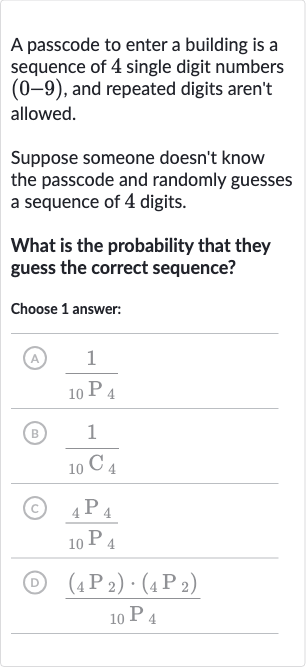AI tutor
Welcome to Bytelearn!
Let’s check out your problem:

A passcode to enter a building is a sequence of single digit numbers , and repeated digits aren't allowed.Suppose someone doesn't know the passcode and randomly guesses a sequence of digits.What is the probability that they guess the correct sequence?Choose answer:(A) (B) (C) (D)
Full solution
Q. A passcode to enter a building is a sequence of single digit numbers , and repeated digits aren't allowed.Suppose someone doesn't know the passcode and randomly guesses a sequence of digits.What is the probability that they guess the correct sequence?Choose answer:(A) (B) (C) (D)
- Understand the problem: Understand the problem.We need to calculate the probability of guessing a correct sequence of digits where no digit repeats and each digit can be from to .
- Calculate total sequences: Calculate the total number of possible -digit sequences without repetition.Since the first digit can be any of the digits (), the second digit can be any of the remaining digits, the third can be any of the remaining digits, and the fourth can be any of the remaining digits, we use the permutation formula for this.Total number of sequences = This is also denoted as , which is the number of permutations of items taken at a time.
- Calculate probability: Calculate the probability of guessing the correct sequence.Since there is only one correct sequence, the probability of guessing it correctly is divided by the total number of possible sequences.Probability =
- Match with options: Match the calculated probability with the given options.The calculated probability matches option (A), which is .
More problems from Compare linear and exponential growth
QuestionGet tutor help
QuestionGet tutor help
QuestionGet tutor help
QuestionGet tutor help
QuestionGet tutor help
QuestionGet tutor help
QuestionGet tutor help
